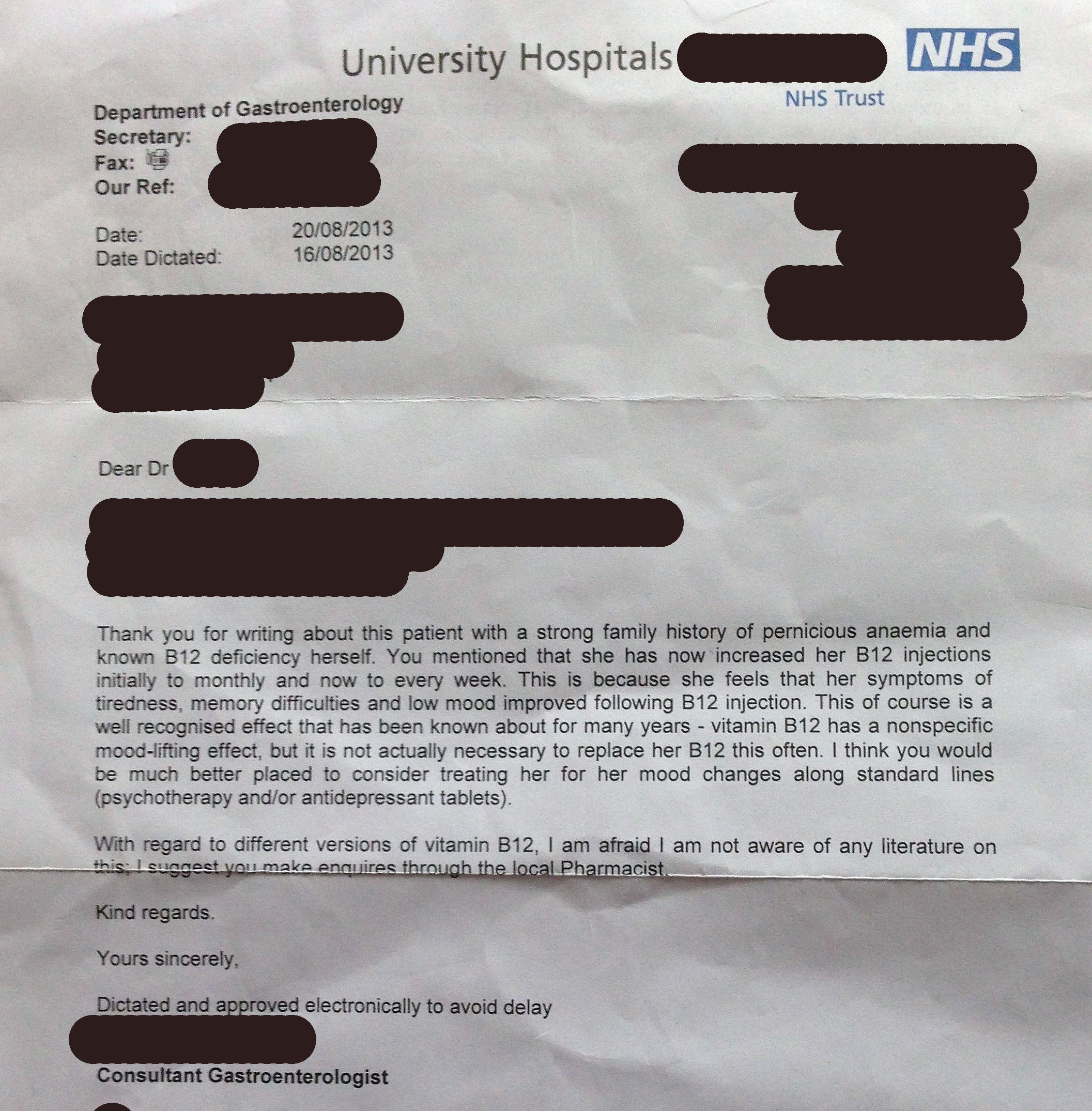Despite the general misconception that B12 deficiency only affects women over 60, this condition does not discriminate. It is those who train our health care professionals and consequently our health care professionals who do. The neuropsychiatric symptoms of B12 deficiency are many and as with all symptoms they can manifest at any age and in either sex.
These include –
• The unborn child
• Babies
• Children
• New mothers
• The middle aged
• The elderly
It appears that very few doctors understand the need to rule out this debilitating neurological disorder once a mental health condition is diagnosed. Of course there are many reasons for poor mental health but to ignore nutritional deficiencies is ridiculous.
One of the most common presenting symptoms of B12 deficiency is depression and yet the chances of a doctor exploring this symptom further to see if there might be a physical cause appears to be very slim.
How many children are incorrectly diagnosed with Bipolar, psychosis, depression when B12 deficiency is the root cause?
How many undiagnosed B12 deficient mothers find themselves devastated by post natal depression following nitrous oxide administration during labour?
How many cases of ‘early onset Alzheimer’s’ remain untested for this easy to treat deficiency?
How many newly diagnosed dementia patients have been taking metformin, or acid suppressants such as Omeprazole?
How many patients live in total confusion when all they lack is the ability to absorb vitamin B12?
How many stroke victims struggling physically and mentally because it never occurred to the clinicians to test for low B12?
How many students unable to complete their studies?
How many lives lost through suicide?
How many careers ruined?
How many lost livelihoods?
How many families broken?
How much money wasted on psychiatric drugs when a vital nutrient is the solution?
How many undiagnosed prisoners are ‘detained at Her Majesty’s pleasure’ for actions and behaviour induced by low B12?
How many patients hospitalised with eating disorders remain undiagnosed with B12 deficiency?
How many patients tested but by clinicians who fail to understand that the B12 serum test is inaccurate?
How many patients rattle with numerous antidepressants given in mega doses due to their reduced efficacy in B12 deficient patients?
The information below is taken from the ‘Fundamental Statistics on Mental Health 2007’
All these statements and statistics have a potential relationship to B12 deficiency and we can only assume that these figures are perhaps even worse now…….
The Fundamental Facts 2007: The Latest Facts and Figures on Mental Health
http://www.mentalhealth.org.uk/content/assets/PDF/publications/fundamental_facts_2007.pdf?view=Standard
How many people experience mental health problems?
• The Office for National Statistics Psychiatric Morbidity report found that in any one year 1 in 4 British adults experience at least one mental disorder, and 1 in 6 experiences this at any given time.
• It is estimated that approximately 450 million people worldwide have a mental health problem.
• 1 in 4 families worldwide is likely to have at least one member with a behavioural or mental disorder.
• The World Health Organisation forecasts that by 2020 depression will be the second leading contributor to the global burden of disease.
Suicide and history of using mental health services
• 42% of people who took their own lives in England and Wales were diagnosed with either a depressive illness or bi-polar disorder, and 20% had schizophrenia or a related disorder.
Postnatal depression
• Post-natal depression, also known as post partum depression, is believed to affect between 8 and 15% of women. Post-natal depression is not the same as the ‘baby blues’ which are very common, but last only a few days.
Dementia
• Dementia affects 5% of people over the age of 65 and 20% of those over 80. About 700,000 people in the UK have dementia (1.2% of the population) at any one time.
• About 60% of dementia cases are caused by Alzheimer’s disease.
• About a fifth of cases of dementia are related to strokes or insufficient blood flow to the brain, these cases being known as vascular dementia.
Children and young people
• The British Medical Association estimates that at any point in time up to 45,000 young people under the age of 16 are experiencing a severe mental health disorder, and approximately 1.1 million children under the age of 18 would benefit from specialist mental health services.
Older people
• Depression affects 1 in 5 people over the age of 65 living in the community and 2 in 5 living in care homes. However, it is likely that only a small proportion of older people with depression are in contact with their GP or mental health services.
• An estimated 70% of new cases of depression in older people are related to poor physical health.
The prison population
• 72% of male and 70% of female sentenced prisoners have at least one mental disorder and 1 in 5 prisoners has four major mental health disorders.
People with poor physical health are at higher risk of experiencing common mental health problems, and people with mental health problems are more likely to have poor physical health.
• Depression affects 27% of people with diabetes, 29% of people with hypertension, 31% of people who have had a stroke, 33% of cancer patients and 44% of people with HIV/AIDS.
• People who experience persistent pain are four times as likely to have an anxiety or depressive disorder as the general population.
Primary care
• Approximately 30% of all GP consultations are related to a mental health problem.
• On average, a person with severe mental health problems has 13 to 14 consultations per year with their GP.
Hospital provision
• The NHS spent about £575 million on acute psychiatric in-patient hospital care in 2005/06,188 about 68% of its budget for clinical mental health services.
Treatment and coping
• According to an online survey by the Mental Health Foundation, of those visiting their GP with depression, 60% were prescribed anti-depressants, 42% were offered counselling and 2% were offered exercise therapy.
Medication
• In 2004, GPs wrote a total of 63.9 million drug prescriptions for mental health problems in England, representing 9.3% of the total prescription by volume.
• Approximately 2 million people of working age in Britain are currently taking psychiatric drugs, most prescribed by their GPs.
•••••••••••••••••••••••••••••••••••••••••••••••••••••••••••••••••••••••
Family doctors in England are to be paid £55 for each patient they diagnose with dementia, NHS bosses say. (http://www.bbc.co.uk/news/health-29718618)
If we gave GP’s just £1 to test ALL mental health patients for B12 deficiency and then another £1 to treat that patient properly the cost savings could be phenomenal, not just to the NHS but to society as a whole. If only 10% of all the above statistics were found to be B12 deficient it would have a profoundly positive impact on NHS resources.
If you or anyone you know suffers with a mental illness, please have look at this list which is just the neuropsychiatric portion of the common B12 deficiency symptoms. You may be surprised and relieved to find that B12 injections could be the answer to restoring your own or a loved ones health.
• Confusion/disorientation
• Psychosis
• Post natal depression
• Hallucinations
• Memory loss
• Delusion
• Depression
• Suicidal ideation
• Mania
• Anxiety
• Paranoia
• Irritability
• Apathy
• Personality changes
• Inappropriate sexual behaviour
• Violent/aggressive behaviour
• Schizophrenic symptoms
• Sleep disturbances
• Insomnia
• Changes in taste, smell, vision, and sensory/motor function which can be mistaken for psychiatric problems
For more information please visit www.b12deficiency.info/b12-and-mental-health/
Every part of society is affected by mental illness, and every part of society is affected by B12 deficiency. Our health care professionals need to keep this in mind, from midwives, to paediatrician’s, oncologists to psychiatrists. All medical disciplines need to be made aware of the facts.
Even those psychiatric patients who are known to be B12 deficient may still remain very unwell due to the high level of under treatment for this condition. Just four injections per year are not enough to repair those damaged nerves. Far more B12 is needed for this important job.
Unfortunately your doctor may be resistant to your request for testing for B12 deficiency.
Over the past couple of years I have been met with the following statements, from GP’s and psychiatrists;
‘They have no symptoms so it would be a waste of NHS funds to test for low B12 ’.
‘B12 deficiency does not affect mental health’.
‘Tremors and tinnitus are not cause by low B12’
‘They already have a diagnosis of Alzheimer’s and poor mental health runs in the family’.
It appears that once you have a diagnosis of mental illness you may be effectively tidied away and forgotten about.
And if you don’t have a mental health diagnosis your doctor might be keener to find one for you, than to give you the vitamin you desperately need.
I’ll leave you with the letter I was sent following my request for more B12 injections.
Best wishes, Tracey



This article made me cry I am just beginning my fight for more frequent injections.